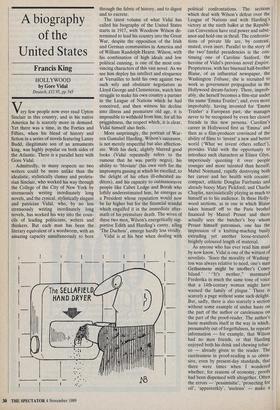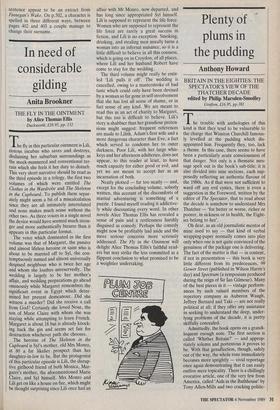A biography of the United States
Francis King
HOLLYWOOD by Gore Vidal
Deutsch, £12.95, pp.543
Very few people now ever read Upton Sinclair in this country, and in his native America he is scarcely more in demand. Yet there was a time, in the Forties and Fifties, when his blend of history and fiction in a series of novels featuring Lanny Budd, illegitimate son of an armaments king, was highly popular on both sides of the Atlantic. There is a parallel here with Gore Vidal.
Admittedly, in many respects no two writers could he more unlike than the idealistic, stylistically clumsy and proleta- rian Sinclair, who worked his way through the College of the City of New York by strenuously writing inordinately long novels, and the cynical, stylistically elegant and patrician Vidal, who, by no less strenuously writing inordinately long novels, has worked his way into the coun- cils of leading politicians, writers and thinkers. But each man has been the literary equivalent of a wordworm, with an amazing capacity simultaneously to bore through the fabric of history, and to digest and to excrete.
The latest volume of what Vidal has called his biography of the United States starts in 1917, with Woodrow Wilson de- termined to lead his country into the Great War, despite the opposition of the Irish and German communities in America and of William Randolph Hearst. Wilson, with his combination of high ideals and low political cunning, is one of the most con- vincing characters of this vast novel. As we see him deploy his intellect and eloquence at Versailles to hold his own against two such wily and obstinate negotiators as Lloyd George and Clemenceau, watch him struggle to make his own country a partner in the League of Nations which he had conceived, and then witness his decline into illness and premature old age, it is impossible to withhold from him, for all his priggishness, the respect which, it is clear, Vidal himself also feels.
More surprisingly, the portrait of War- ren Gamaliel Harding, Wilson's successor, is not merely respectful but also affection- ate. With his dark, slightly blurred good looks (Vidal repeatedly refers to the rumour that he was partly negro), his ability to 'bloviate' (his own verb for,the impromptu gassing at which he excelled, to the delight of his often ill-educated au- ditors), and his capacity to outmanoeuvre people like Cabot Lodge and Borah who loftily underestimated him, he emerges as a President whose reputation would now be far higher but for the financial scandal which engulfed it in the immediate after- math of his premature death. The wives of these two men, Wilson's energetically sup- portive Edith and Harding's canny, ailing 'The Duchess', emerge hardly less vividly.
Vidal is at his best when dealing with political confrontations. The sections which deal with Wilson's defeat over the League of Nations and with Harding's victory at the ninth ballot at the Republi- can Convention have real power and subst- ance and hold one in thrall. The confronta- tions of private life are, by contrast, muted, even inert. Parallel to the story of the two' fateful presidencies is the con- tinuing one of Caroline Sanford, the heroine of Vidal's previous novel Empire. Proprietress, with her bisexual half-brother Blaise, of an influential newspaper, the Washington Tribune, she is recruited to work as government propagandist in the Hollywood dream-factory. There, improb- ably, she herself becomes a film-star under the name 'Emma Traxler'; and, even more improbably, having invented for 'Emma Traxler' a European past, she manages never to be recognised by even her closest friends in this new persona. Caroline's career in Hollywood first as 'Emma' and then as a film-producer convinced of the ability of films to 'invent' a new and better world ('What we invent others reflect'), provides Vidal with the opportunity to introduce such characters as Elinor Glyn, imperiously queening it over people younger and more talented than herself; Mabel Normand, rapidly destroying both her career and her health with cocaine; compact, athletic Douglas Fairbanks and already boozy Mary Pickford; and Charlie Chaplin, narcissistically playing as much to himself as to his audience. In these Holly- wood sections, as in one in which Blaise takes himself off to the Paris brothel financed by Marcel Proust and there actually sees the butcher's boy whom Proust himself patronises, one has the impression of a knitting-maching busily extruding yet another loose-textured, brightly coloured length of material.
As anyone who has ever read him must by now know, Vidal is one of the wittiest of novelists. 'Since the morality of Washing- ton was always relative to need, one's man Gethsemene might be another's Coney Island.' "It's mother," murmured Frederika in much the same tone of voice that a 14th-century woman might have warned the family of plague.' There is scarcely a page without some such delight. But, sadly, there is also scarcely a section without some example of undue haste on the part of the author or carelessness on the part of the proof-reader. The author's haste manifests itself in the way in which, presumably out of forgetfulness, he repeats information — for example, that Wilson had no men friends, or that Harding enjoyed both his drink and chewing tobac- co — already given to the reader. The carelessness in proof-reading is so obtru- sive, even by present-day standards, that there were times when I wondered whether, for reasons of economy, proofs had been dispensed with altogether. Often the errors — 'pessimisitic', 'prosecting for oil', 'apparentkly', `uselesss' — make a sentence appear to be an extract from Finnegan's Wake. On p.502, a character is spelled in three different ways; between pages 402 and 403 a couple manage to change their surname.

















































 Previous page
Previous page